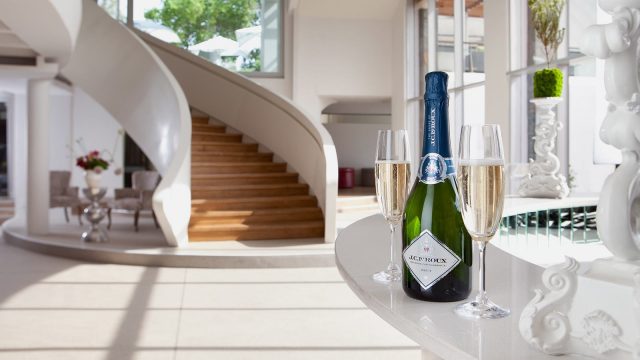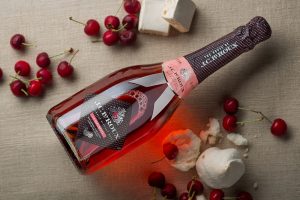In this article, Carla Lewis-Balden finds out more about Méthode Cap Classique (MCC), South Africa’s answer to champagne, during a visit to The House of J.C. Le Roux, the country’s leading producer of South African sparkling wine.
As far as locations for wine tastings go, The House of J.C. Le Roux is quite spectacular. The fine dining restaurant, Le Venue, overlooks the lush green Devon Valley, with the blue-purple Stellenbosch mountains in the background. The tasting venue is an elegant room, decorated in hues of silver and blue.
I’m here to find out more about Méthode Cap Classique, or MCC as it is known locally. People have referred to it as the “poor man’s champagne,” but this proudly South African-produced sparkling wine does not have to stand back one bit from its European cousins, champagne and prosecco.
If there is one thing cellar master of The House of J.C. Le Roux, Elunda Basson is adamant about, is that MCC isn’t a “generic champagne.” It’s a proudly South African product with its own unique character.”
“We craft each J.C. Le Roux Cap Classique in the time honoured French tradition,” she explains. During this process, the bubbles aren’t infused with carbon dioxide, as with ordinary sparkling wine. “The delicate bubbles are created during the process of secondary fermentation in the bottle.”
Even though South African MCC is made exactly the same way as French champagne, it may not be called that, according to the international laws of appellation. This means that only the wine made from grapes grown in the Champagne region of France may be called “champagne.”
“We do use chardonnay and pinot noir as the French do, but sometimes we experiment with other varieties. The biggest difference is in the terroir, the area and soil where the grapes are grown and the climate.
“Part of our style lies in the diversity that we get from sourcing our grapes from different climatic areas. In that way, we build on the different characteristics of our base wines.”
Their Chardonnay comes from a cooler climate with mineral chalky soil. “Our Pinot Noir is much more robust and upfront; we source the grapes from warmer climates. Combining these give us complexity in style,” she explains.
“We source our grapes from all over the Western Cape, like Stellenbosch, Philadelphia, Durbanville, Elgin, Paarl, and Robertson,” she added.
J.C. Le Roux’s MCC’s have been put to the test against champagne. Basson explains that this keeps them competitive in the global market, and also assists with quality control.
“We often invite French producers to South Africa to come and taste our wines in blind line-ups. Our wines are distinctive in style, yet often compare well to our French counterparts. We don’t want to try and be French though; we want to be uniquely South African but be able to compete fairly in quality of our products.”
J.C. Le Roux has several MCCs for all palates. The La Vallée is one of their more accessible, easy-drinking MCCs. This off-dry Cap Classique is a fresher and lighter style of MCC and will be enjoyed by people with a drier palate as well as those enjoying a slightly sweeter taste.
However, it’s their signature Cap Classique Scintilla 2008 that’s the cellar’s pride and joy. Scintilla is only produced in exceptional vintages and follows in the footsteps of its award-winning predecessor, the 2012 Amorim Méthode Cap Classique Challenge champion, Scintilla 2003.
A winemaker friend of mine, who also makes MCC, insists that this is the best Cap Classique in South Africa.The wine is smooth and well-balanced, with a hint of lemon.
“The Scintilla 2008 is a classic blend of Chardonnay (70%) and Pinot Noir (30%). It has spent a minimum of five years on the lees to develop its complexity and regal character,” Basson explains. It retails for R180 (about US$17) at the cellar, which offers excellent value for money, if you compare it with the price of champagne. Guests from overseas often order several cases of Scintilla to ship home.
I suggest doing the marshmallow and meringue pairing, where three of J.C. Le Roux’s MCC’s and two of their sparkling wines are paired with gourmet marshmallows and meringues. The sweets each has a different subtle flavour to bring out the best flavours in the wine. The tasting costs R65 (about US$6). Bring a designated driver, they are generous with their servings.
The House of J.C. Le Roux is open seven days a week. Le Venue is open Monday to Friday from 09h00 till 18h00. Saturday from 09:00 to 16:00 and Sunday 09:00 to 14:00. Book at +27 21 865 8222 or visit www.jcleroux.co.za



